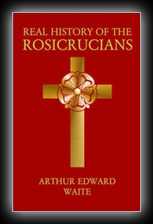
The Real History of the Rosicrucians - Founded on Their Own Manifestoes, and on Facts and Documents Collected from the Writings of Initiated Brethren
by Arthur Edward Waite
1887
This is Arthur Edward Waite's study of the elusive Rosicrucians, a secret society of which the first public notice was in early 17th century Germany. Was this an actual organization, or just a fantasy? No actual Rosicrucians ever surfaced, but there was plenty of documentation about them. The problem is that these documents are, for the most part, obviously fictional. In time, a mythology grew up around the Rosicrucians. Today there are groups which claim the name. These date at the most to the late 19th century, although they usually claim pro forma to go back as far as Egypt or Atlantis. The Rosicrucians have also been woven by conspiracy theorists into their web alongside the Freemasons, Illuminati, Templars, and so on, even though there is not a shred of evidence for this.
Waite presents complete translations of all of the texts which defined the Rosicrucians, including the Fama Fraternitatis, the Confessio Fraternitatis, and the Chemical Wedding of Christian Rosencreutz. The longest text, the Chemical Wedding is a fever-dream which is a thinly veiled alchemical allegory. The authorship of these documents is disputed, but it may have been written by Johann Valentin Andreas, a German theologian and writer. Waite also surveys Rosicrucian literature from successive centuries, including extensive quotes from authors who wrote about the Rosicrucians such as Michael Maier, Robert Fludd, Thomas Vaughan and John Heydon. Heydon wrote Voyage to the Land of the Rosicrucians, reminiscent of Thomas More's Utopia, about a voyage to an obscure continent inhabited by Rosicrucians, included here in its entirety.
All in all, this serves both as a survey of the literature about Rosicrucians and an invaluable anthology of that literature. Waite, although he had a solid background in the occult, is in a firmly rationalist mode in this book. The Real History will be of use to both academic and general readers, and makes fascinating reading. --J.B. Hare
